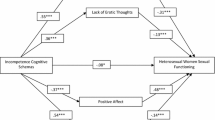Abstract
The objective of the present study was to investigate the role played by early maladaptive schemas (EMS) on male sexual functioning and clarify the way these nuclear cognitive structures discriminate men with and without sexual dysfunction. A total of 242 men participated in the study (a community sample of 200 men and a clinical sample of 42 men with a DSM-IV diagnosis of sexual dysfunction). The community sample was divided into a control group (n = 147) and a sub-clinical group (n = 53), according to the cutoff scores of the International Index of Erectile Dysfunction (Rosen et al., 1997). All participants completed a set of measures assessing EMS (Young & Brown, 1989), sexual functioning (Rosen et al., 1997), psychopathology (Derogatis & Spencer, 1982), and cognitive schemas activated in hypothetical unsuccessful sexual situations (Nobre & Pinto-Gouveia, 2009a). Findings supported the hypothesis of a typical cognitive pattern in men with sexual difficulties. After controlling for psychopathology, men with sexual dysfunction reported more dependence/incompetence EMS and activated more difference, helpless, and particularly incompetence schemas in hypothetical unsuccessful sexual situations, in comparison to sexually healthy men. These results have important therapeutic implications for sex therapy.
Similar content being viewed by others
References
American Psychiatric Association. (2000). Diagnostic and statistical manual of mental disorders (4th ed., text rev.). Washington, DC: Author.
Andersen, B., & Cyranowski, J. (1994). Women’s sexual self-schema. Journal of Personality and Social Psychology, 67, 1079–1100.
Andersen, B., Cyranowski, J., & Espindle, D. (1999). Men’s sexual self-schema. Journal of Personality and Social Psychology, 76, 645–661.
Bancroft, J., Carnes, L., Janssen, E., Goodrich, D., & Long, J. (2005). Erectile and ejaculatory problems in gay and heterosexual men. Archives of Sexual Behavior, 34, 285–297.
Barlow, D. H. (1986). Causes of sexual dysfunction: The role of anxiety and cognitive interference. Journal of Consulting and Clinical Psychology, 54, 140–148.
Beck, J. G. (1995). Cognitive therapy: Basics and beyond. New York: Guilford Press.
Beck, J. (1996). Cognitive therapy of personality disorders. In P. M. Salkovskis (Ed.), Frontiers of cognitive therapy (pp. 165–181). New York: Guilford Press.
Canavarro, M. C. (1999). Inventário de sintomas psicopatológicos [Psychopathological symptom inventory]. In M. R. Simões, M. M. Gonçalves, & L. S. Almeida (Eds.), Testes e Provas Psicológicas em Portugal (pp. 95–109). Braga: APPORT/SHO.
Cappelleri, J. C., Rosen, R. C., Smith, M. D., Mishra, A., & Osterloh, I. H. (1999). Diagnostic evaluation of the erectile function domain of the International Index of Erectile Function. Urology, 54, 346–351.
Cyranowski, J. M., Aarestad, S. L., & Andersen, B. L. (1999). The role of sexual self-schema in a diathesis-stress model of sexual dysfunction. Applied & Preventive Psychology, 8, 217–228.
Delattre, V., Servant, D., Rusinek, S., Lorette, C., Parquet, P. J., Goudemand, M., et al. (2004). The early maladaptive schemas: A study in adult patients with anxiety disorders. L’Encephale, 30, 255–258.
Derogatis, L. R. (1993). Brief symptom inventory: Administration, scoring, and procedures manual (4th ed.). Minneapolis, MN: National Computer Systems.
Derogatis, L. R., & Spencer, P. M. (1982). The brief symptom inventory: Administration, scoring, and procedures manual. Baltimore, MD: Clinical Psychometric Research.
DiBartolo, P. M., & Barlow, D. H. (1996). Perfectionism, marital satisfaction, and contributing factors to sexual dysfunction in men with erectile disorder and their spouses. Archives of Sexual Behavior, 25, 581–588.
Mathews, A., & MacLeod, C. (2005). Cognitive vulnerability to emotional disorders. Annual Review of Clinical Psychology, 1, 167–195.
McGinn, L., & Young, J. (1996). Schema-focused therapy. In P. M. Salkovskis (Ed.), Frontiers of cognitive therapy (pp. 182–207). New York: Guilford Press.
Nobre, P. J. (2009). Determinants of sexual desire problems in women: Testing a cognitive-emotional model. Journal of Sex and Marital Therapy, 35, 360–377.
Nobre, P. J. (2010). Psychological determinants of erectile dysfunction: Testing a cognitive-emotional model. Journal of Sexual Medicine, 7, 1429–1437.
Nobre, P. J., & Pinto-Gouveia, J. (2006a). Emotions during sexual activity: Differences between sexually dysfunctional and dysfunctional men and women. Archives of Sexual Behavior, 35, 491–499.
Nobre, P. J., & Pinto-Gouveia, J. (2006b). Dysfunctional sexual beliefs as vulnerability factors for sexual dysfunction. Journal of Sex Research, 43, 68–75.
Nobre, P. J., & Pinto-Gouveia, J. (2008). Differences in automatic thoughts presented during sexual activity between sexually functional and dysfunctional men and women. Journal of Cognitive Therapy and Research, 32, 37–49.
Nobre, P. J., & Pinto-Gouveia, J. (2009a). Cognitive schemas associated with negative sexual events: A comparison of men and women with and without sexual dysfunction. Archives of Sexual Behavior, 38, 842–851.
Nobre, P. J., & Pinto-Gouveia, J. (2009b). Questionnaire of cognitive schema activation in sexual context: A measure to assess cognitive schemas activated in unsuccessful sexual situations. Journal of Sex Research, 46, 425–437.
Nordahl, H., & Nysaeter, T. (2005). Schema therapy for patients with borderline personality disorder: A single case series. Journal of Behavior Therapy and Experimental Psychiatry, 36, 254–264.
Pinto-Gouveia, J., Castilho, P., Galhardo, A., & Cunha, M. (2006). Early maladaptive schemas and social phobia. Cognitive Therapy and Research, 30, 571–584.
Pinto-Gouveia, J., Robalo, M., Cunha, M., & Fonseca, L. (1997). O Questionário de Esquemas de Young: aferição e utilização na população portuguesa [Young’s Schema Questionnaire: Translation and adaptation to the Portuguese population]. Paper presented at the V Latini Dies, Cascais, Portugal.
Quinta Gomes, A. L., & Nobre, P. J. (in press). The International Index of Erectile Function (IIEF-15): Psychometric properties of the Portuguese version. Journal of Sexual Medicine.
Riso, L. P., Maddux, R. E., & Santorelli, N. T. (2007). Early maladaptive schemas in chronic depression. In L. P. Riso, P. L. du Toit, D. J. Stein, & J. E. Young (Eds.), Cognitive schemas and core beliefs in psychological problems: A scientist-practitioner guide (pp. 41–58). Washington, DC: American Psychological Association.
Rosen, R. C., Cappelleri, J. C., & Gendrano, N. (2002). The International Index of Erectile Function (IIEF): A state-of-the-science review. International Journal of Impotence Research, 14, 226–244.
Rosen, R. C., Riley, A., Wagner, G., Osterloh, I. H., Kirkpatrick, J., & Mishra, A. (1997). The International Index of Erectile Function (IIEF): A multidimensional scale for assessment of erectile dysfunction. Urology, 49, 822–830.
Rosenheim, E., & Neumann, M. (1981). Personality characteristics of sexually dysfunctioning males and their wives. Journal of Sex Research, 17, 124–138.
Sbrocco, T., & Barlow, D. H. (1996). Conceptualizing the cognitive component of sexual arousal: Implications for sexuality research and treatment. In P. M. Salkovskis (Ed.), Frontiers of cognitive therapy (pp. 419–449). New York: Guilford Press.
Sbrocco, T., Weisberg, R. B., & Barlow, D. H. (1992). Sexual Dysfunction Interview (SDI). Boston, MA: Center for Anxiety and Related Disorders, Boston University.
Schmidt, N. B., Joiner, T. E., Young, J. E., & Telch, M. J. (1995). The Schema Questionnaire: Investigation of psychometric properties and the hierarchical structure of a measure of maladaptive schemas. Cognitive Therapy and Research, 19, 295–321.
Wiegel, M., Scepkowski, L., & Barlow, D. (2007). Cognitive-affective processes in sexual arousal and sexual dysfunction. In E. Janssen (Ed.), The psychophysiology of sex (pp. 143–165). Bloomington: Indiana University Press.
Young, J. E. (1990). Cognitive therapy for personality disorders: A schema-focused approach. Sarasota, FL: Professional Resource Exchange.
Young, J. E. (1999). Cognitive therapy for personality disorders: A schema-focused approach (3rd ed.). Sarasota, FL: Professional Resource Exchange.
Young, J., & Brown, G. (1989). Schema Questionnaire. Unpublished manuscript, Cognitive Therapy Centre of New York.
Young, J., Klosko, J., & Weishaar, M. (2003). Schema therapy: A practitioner’s guide. New York: Guilford Press.
Author information
Authors and Affiliations
Corresponding author
Rights and permissions
About this article
Cite this article
Quinta Gomes, A.L., Nobre, P. Early Maladaptive Schemas and Sexual Dysfunction in Men. Arch Sex Behav 41, 311–320 (2012). https://doi.org/10.1007/s10508-011-9853-y
Received:
Revised:
Accepted:
Published:
Issue Date:
DOI: https://doi.org/10.1007/s10508-011-9853-y



